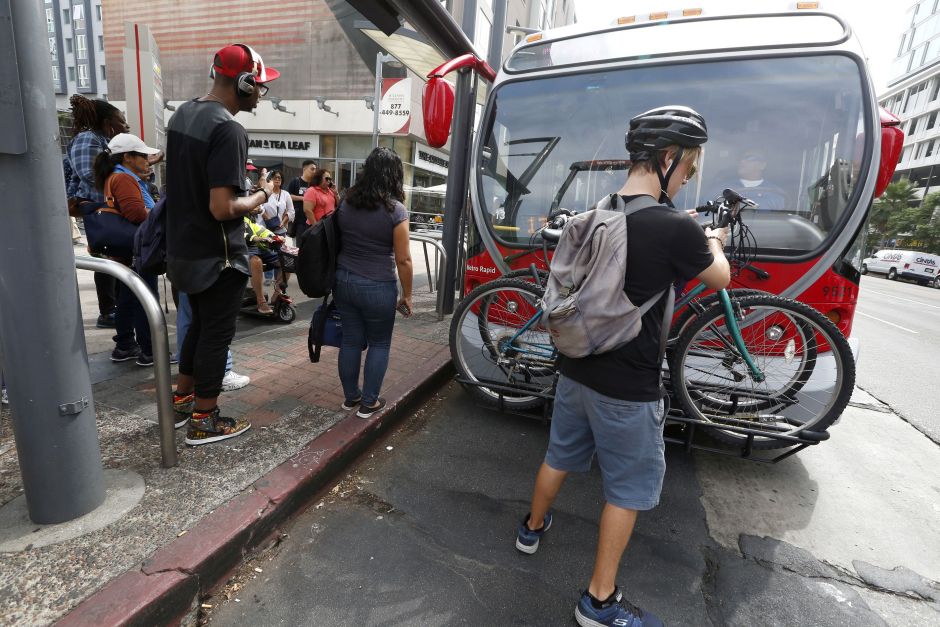
Mayor indicates that the transfers spread the COVID-19; Metro says it has taken measures to protect travelers
The mayor of the city of Carson, Albert Robles, asked yesterday that the public transport service Los Angeles (Metro) immediately cancel the use of its buses and trains to prevent the spread of the coronavirus.
“Here at Carson we have already suspended our local transportation services. I know it is inconvenient for our residents and for those who live in South Los Angeles County, but I would rather say "I am sorry for the inconvenience" than having to say "I regret your loss," "Robles told La Opinion.
"People (could) die because these buses serve as propagators of the coronavirus," he added.
In a previous article, a Metro bus driver told La Opinion that he estimated that during the pandemic it carries 20% of stranded passengers.
The Carson City Council released this request after it was reported that an MTA bus driver tested COVID-19 positive. The worker was serving his route starting at a terminal that is an MTA subcontractor in Carson. There dozens of MTA buses arrive.
Carson authorities question whether this driver could have infected more people.
"And although Metro has already quarantined the bus driver and the people with whom it had contact, they have not quarantined all the passengers who got on and off," said Robles.
Last week the mayor sent a letter to Metro director and CEO Philip Washington asking to cancel the service. In response, the response was that services could be suspended because essential personnel, such as lifeguards and nurses, depend on public transport.
"The Metro will continue to provide service while we can," Washington said in the letter to Robles.
The mayor explained that if first responders, nurses and doctors are taking the bus, it is an even greater reason for the bus service to stop "because these immediate intervention professionals should not be exposed to the coronavirus in this way."
Carson Councilman Jawane Hilton said that while the new rule that passengers enter from the back of the bus has been created, it is not safe.
“We cannot disinfect trucks after each passenger. People hold on to the handrail. People are close to each other, "he said. “It is impossible to practice social distance on the bus. So I think public transportation transports COVID-19 everywhere.
Robles said the people who use public transportation the most are low-income, Latino, and African-American. He also indicated that for the most part, bus drivers tend to be
minorities. "They do not have adequate protection. They are exposed ”, he expressed.
Transportation options
Due to the health crisis, the Carson Disaster Council decided to suspend Carson's transportation service from Saturday, March 28, until further notice.
Carson Circuit is a fixed-route bus system consisting of eight routes that provide local transportation to the Carson community and serves as a connector for other regional providers.
Instead, residents of the area were asked to stay home and, if necessary, to travel within Carson, to request a service from Lyft – which during the pandemic is relatively cheap.
Robles said the city promised to pay half the fare for Carson residents – who travel within the city – for necessary activities such as going to the doctor, shopping for groceries, or visiting family members.
Financial aid is thanks to a grant the City received in 2019 from the South Coast Air Quality Management District (AQMD) to encourage the use of public transportation.
When Carson announced its temporary cancellation of local buses and asked to use the money for its residents' trips, Metro approved the grant.
The mayor said that if the agency is aware of the service that can be provided to "essential" workers, he does not understand why they do not put this same plan into practice in the city of Los Angeles.
"If there is a nurse or doctor who uses public transportation, then we need to get them out of there for their safety, and there are alternatives," said Robles.
Not for now
In response, Metro said it will continue to provide transportation in Los Angeles County as they are considered a critical entity for Southern California's health, business and civic infrastructure.
He added that he currently transports some 300,000 people a day, which is "the number of essential workers who trust the service."
The agency said it has strengthened the cleanliness of buses, trains such as at Union Station and other major transit centers.
"This includes a heightened focus on cleaning high-point-of-contact areas such as handrails, elevator buttons, and ticket vending machines," a statement said Metro.
"We are doing everything we can to maintain a healthy and safe system for our customers who depend on Metro to get where they need to be in Los Angeles County."
Regarding homeless people who travel in the Metro aimlessly, the agency said that as of Wednesday, April 1, they began to carry out "evaluations" of passengers in some of the busiest transit centers.
The work is done in conjunction with the Metro police and the non-profit organization People Assisting the Homeless (PATH).
"The purpose of the evaluations is to: educate passengers on the importance of limiting travel to essential activities and trying to connect vulnerable people with shelter beds."
In addition, a new rule will apply that limits one bag or personal item per passenger.






